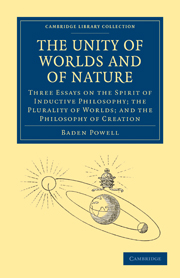 The Unity of Worlds and of Nature
The Unity of Worlds and of Nature Book contents
- Frontmatter
- PREFACE TO THE SECOND EDITION
- PREFACE TO THE FIRST EDITION
- Contents
- ESSAY I ON THE SPIRIT OF THE INDUCTIVE PHILOSOPHY
- ESSAY II ON THE UNITY OR PLURALITY OF WORLDS
- ESSAY III ON THE PHILOSOPHY OF CREATION
- INTRODUCTION: Nature of the proposed Inquiry
- I THE EVIDENCE DERIVED FROM GEOLOGY
- II THE EVIDENCE DERIVED FROM PHYSIOLOGY
- III GENERAL CONSIDERATIONS ARISING OUT OF THE PRECEDING EVIDENCE
- IV THE BEARING OF THE PRECEDING ARGUMENTS ON THE THEOLOGICAL VIEW OF CREATION
- APPENDIX
- ERRATA
II - THE EVIDENCE DERIVED FROM PHYSIOLOGY
Published online by Cambridge University Press: 29 August 2010
- Frontmatter
- PREFACE TO THE SECOND EDITION
- PREFACE TO THE FIRST EDITION
- Contents
- ESSAY I ON THE SPIRIT OF THE INDUCTIVE PHILOSOPHY
- ESSAY II ON THE UNITY OR PLURALITY OF WORLDS
- ESSAY III ON THE PHILOSOPHY OF CREATION
- INTRODUCTION: Nature of the proposed Inquiry
- I THE EVIDENCE DERIVED FROM GEOLOGY
- II THE EVIDENCE DERIVED FROM PHYSIOLOGY
- III GENERAL CONSIDERATIONS ARISING OUT OF THE PRECEDING EVIDENCE
- IV THE BEARING OF THE PRECEDING ARGUMENTS ON THE THEOLOGICAL VIEW OF CREATION
- APPENDIX
- ERRATA
Summary
Physiology essential to the inquiry
Geology is essentially dependent on physiology; hence any argument derived from the former science, as bearing on the evidence of “creation” in the organic world, must be in some degree an application of the latter; as, indeed, is manifest throughout the foregoing remarks. But some questions are involved in the present inquiry, which depend on a more particular reference to points of pure physiology; and to these the present section relates.
Researches of Cuvier
From the researches of Cuvier, the whole science of comparative anatomy received a vast, and at the time unimagined, extension, in its application to the organic remains of the ancient earth (first systematically carried out by Von Buch), and the recognition of extinct species, allied to existing forms, in what were hitherto imagined to be either relics of legendary monsters and antediluvian giants, or else mere “lusus Naturæ” created by her “plastic powers.”
The intellectual character of Cuvier was equally marked by high powers of generalisation and by a dislike of theorising, or indulging in speculations, as to the causes of the phenomena observed. Yet he inclined, nevertheless, very strongly to the idea of investigating organised structures on the principle which he termed “conditions of existence,” or what has been since called “teleology.”
- Type
- Chapter
- Information
- The Unity of Worlds and of NatureThree Essays on the Spirit of Inductive Philosophy; the Plurality of Worlds; and the Philosophy of Creation, pp. 380 - 430Publisher: Cambridge University PressPrint publication year: 2009First published in: 1856
